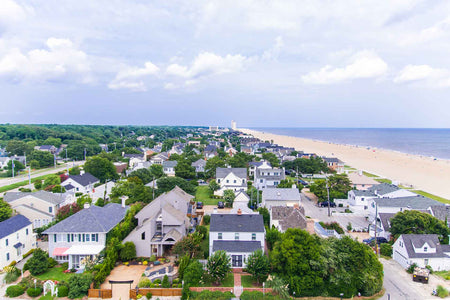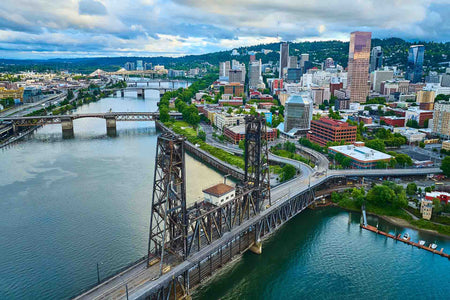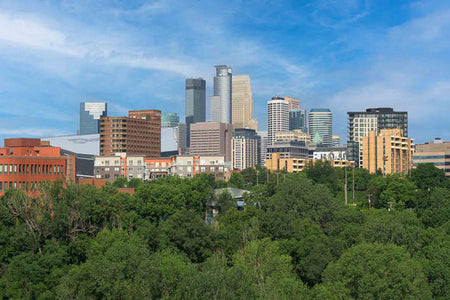- Allergy season in Massachusetts lasts from early spring to late fall. Tree, grass, and weed pollen are the main culprits.
- The worst months for allergies in Massachusetts are April and May.
- Planning ahead can make allergy season easier. Using allergy medication proactively, checking pollen forecasts, avoiding high-pollen times outdoors, and filtering indoor air can help.
Massachusetts is home to stunning fall foliage, cranberry bogs, and the famous Boston Marathon. But along with its beauty and traditions, the state also experiences strong allergy seasons that can make breathing difficult for some people.
You may be a resident or a visitor looking to enjoy the sights. Regardless, it's important to know when allergies are at their worst.
This article will cover allergy season in Massachusetts, the toughest months for allergies, common allergens to watch out for, and tips to help you prepare.
When is Allergy Season in Massachusetts?
Allergy season in Massachusetts starts in early spring and lasts until the first frost in fall. During this time, pollen from trees, grass, and weeds float in the air and can make people sneeze, have itchy eyes, or feel stuffy.
Spring Allergies in Massachusetts
Spring allergies in Massachusetts start in March when trees like ash, birch, elm, and maple release pollen into the air. These trees grow in parks, forests, and neighborhoods across the state. Their pollen can cause sneezing, congestion, itchy eyes, and asthma flare-ups in sensitive people. Windy days make symptoms worse by spreading pollen through the air.
Summer Allergies in Massachusetts
Summer allergies in Massachusetts are worst from late May to July because grasses like Bermuda, Timothy, Redtop, and Ryegrass release pollen into the air. This pollen can make people sneeze, feel stuffy, have itchy eyes, or get skin rashes. Hot, dry, and windy days can make allergies worse by spreading more pollen around.
Fall Allergies in Massachusetts
In Massachusetts, fall allergies are mostly caused by ragweed pollen and mold. Ragweed pollen can travel far in the air and make people with allergies feel really sick [*]. Mold, on the other hand, grows in wet places like piles of fallen leaves, and it gets worse as autumn goes on. Rainy or humid weather helps mold grow, which can make allergy symptoms even worse.
Winter Allergies in Massachusetts
Winter in Massachusetts gives people a break from outdoor allergies like pollen, but indoor allergies can still be a problem. Dust mites, pet dander, and mold stay inside homes, causing sneezing, stuffy noses, and itchy eyes.
Many houses in Massachusetts keep windows shut and use heaters in the winter, which traps these allergens inside. Dry indoor air from heating systems can also irritate the nasal passages, making symptoms worse. Some homes, especially older ones or those with basements, may have more mold due to moisture buildup.
What are the Worst Months for Allergies in Massachusetts?
The worst months for allergies in Massachusetts are usually April and May. During this time, tree pollen peaks, causing the most severe reactions.
Trees such as ash, birch, elm, and maple release large amounts of pollen during this period, leading to symptoms like sneezing, congestion, itchy eyes, and asthma flare-ups in sensitive individuals. Wind can spread these high pollen counts over large areas.
It's also noteworthy that grass pollen season follows, starting in late May and lasting through early July, with grasses like Bermuda, Timothy, Redtop, and Ryegrass contributing to allergy symptoms.
Therefore, individuals sensitive to tree and grass pollens may experience heightened allergy symptoms from April through July in Massachusetts.
When Does Allergy Season End in Massachusetts?
Allergy season in Massachusetts usually ends with the first frost in the fall, though the timing can vary each year. The first frost reduces allergens like ragweed pollen and mold spores. As temperatures drop, pollen counts lower, which brings relief to allergy sufferers. By late October or early November, most outdoor allergens are no longer a major concern.
Common Allergens in Massachusetts
People may encounter various allergens that can trigger allergic reactions. Here's an overview of common allergens found in Massachusetts:
Tree pollen:
- Ash
- Birch
- Elm
- Maple
- Oak
- Pine
- Hickory
- Willow
- Mulberry
Grass pollen:
- Bermuda
- Timothy
- Redtop
- Ryegrass
- Sweet vernal
- Orchard grasses
Weed pollen:
- Ragweed
- English plantain
- Mugwort
- Russian thistle
- Wormwood
- Marsh elder
- Amaranth
Indoor allergens:
- Dust mites
- Pet dander
- Mold
How to Prepare for Massachusetts Allergy Season
Preparing for allergy season in Massachusetts is important to minimize discomfort and maintain well-being. Here are some tips to help you get ready:
- Take your allergy medications: Start taking your allergy medications before symptoms begin.
- Monitor local pollen forecast: Keep an eye on pollen forecasts in your area so you can plan outdoor activities around times when pollen counts are lower. This will help reduce your exposure.
- Stay indoors in high pollen periods: In Massachusetts, pollen levels are usually highest in the early morning, just after dawn, and can stay elevated in the late morning and afternoon. On days with high pollen counts, try to stay inside during these times.
- Keep windows closed: Shut windows and doors during high pollen seasons to prevent allergens from entering your home. This will also keep your indoor air cleaner.
- Use HEPA filters: Install HEPA filters in your home's air conditioning units to trap pollen, dust, and other allergens, which improves indoor air quality.
- Clean regularly: Regular cleaning, including dusting and vacuuming with a HEPA filter, helps remove pollen and other allergens from your living space.
- Avoid hanging your laundry outside: Pollen can easily attach to outdoor laundry, so avoid hanging clothes and bedding outside during allergy season to prevent pollen buildup.
- Wear protection when going outside: Wearing sunglasses, a hat, or a pollen mask can help protect you from airborne allergens when you need to be outside.
- Shower and change clothes: After spending time outdoors, showering and changing clothes can remove pollen from your skin and hair, which prevents it from spreading indoors.
The Bottom Line
Allergy season in Massachusetts can be tough, but knowing what to expect can help you feel better. Pollen from trees, grasses, and weeds can make spring, summer, and fall difficult for people with allergies. In winter, indoor allergens like dust and pet dander can still cause sneezing and itchy eyes.
To stay comfortable, take allergy medicine such as a customized Allermi nasal spray before your symptoms start, check pollen forecasts, and try to avoid allergens as much as possible.
References:
- Ragweed allergies. (2020, October 28). Allergy & Asthma Network. https://allergyasthmanetwork.org/allergies/pollen-allergy/ragweed-allergy/









